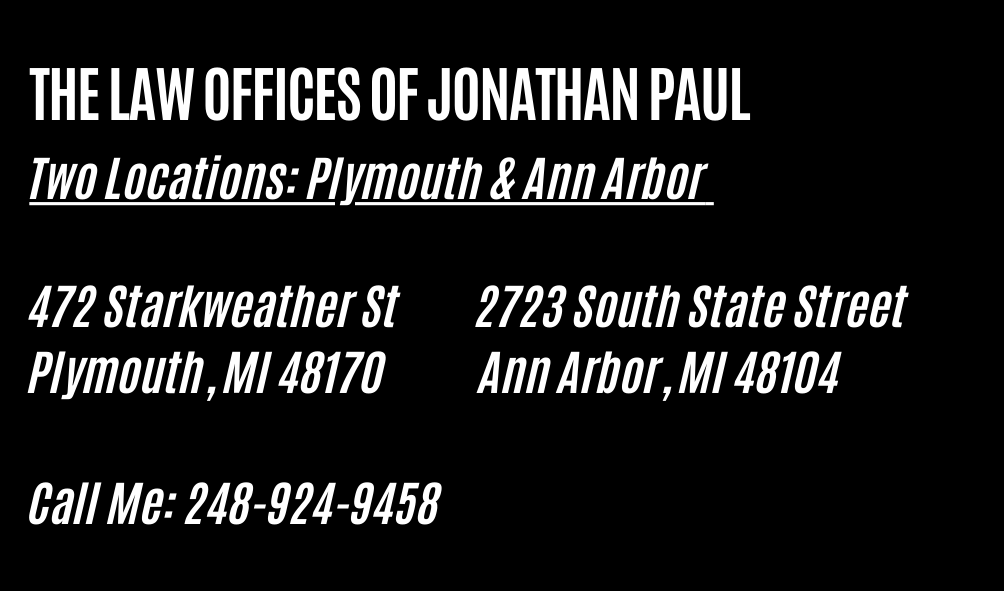Oakland County DUI LawyerThis is the #1 question that a client faces when charged with a drunk driving offense. The answer varies for every client, because each case brings different strengths and weaknesses to the table. For a DUI case in Michigan, there are essentially two things to challenge: the driving and "drunk".
What I mean by this, is in Michigan the prosecutor must proof beyond a reasonable doubt that you were operating a vehicle aka driving. The law defines operating as things beyond driving down the road or highway, which most imagine - it also may include sitting in your car, in park, with the engine on - the Michigan courts have gotten specific on these definitions, but it is broader than most imagine.
As for the "drunk", Michigan law has various offenses, which are at times defined by a BAC level, such as Operating While Intoxicated, which is a 0.08 level, and High BAC or Super Drunk, which is 0.17. Most view those offenses as the standards to overcome at a trial. Clients don't realize that the prosecutor has the ultimate backup plan called Impaired Driving, which does not require a BAC reading on the Datamaster or a blood test.
Many times a client and I have a plan to beat the Datamaster or blood, but even if we defeat it, we're now facing the lower threshold of impairment. OK we knock the 0.15 BAC Datamaster result out of the case due to an issue with the machine or the process used to obtain the breath sample, but other evidence in the case indicate impairment outside of the chemical test.
The impaired charge does have benefits, but many times prosecutors are willing to make this offer to resolve the case - does a client want to risk the higher charge and the extra costs of trial and end up with the same result, or do they want to come to a compromise. On a first offense there is a difference, but on a 2nd or 3rd offense, the impaired will trigger the same penalties for being a repeat offender such as mandatory jail, felony and loss a license at a minimum.
If you're deciding between plea or trial, speak to your lawyer about he hidden impairment charge, and how this may or may not impact your decision.
What I mean by this, is in Michigan the prosecutor must proof beyond a reasonable doubt that you were operating a vehicle aka driving. The law defines operating as things beyond driving down the road or highway, which most imagine - it also may include sitting in your car, in park, with the engine on - the Michigan courts have gotten specific on these definitions, but it is broader than most imagine.
As for the "drunk", Michigan law has various offenses, which are at times defined by a BAC level, such as Operating While Intoxicated, which is a 0.08 level, and High BAC or Super Drunk, which is 0.17. Most view those offenses as the standards to overcome at a trial. Clients don't realize that the prosecutor has the ultimate backup plan called Impaired Driving, which does not require a BAC reading on the Datamaster or a blood test.
Many times a client and I have a plan to beat the Datamaster or blood, but even if we defeat it, we're now facing the lower threshold of impairment. OK we knock the 0.15 BAC Datamaster result out of the case due to an issue with the machine or the process used to obtain the breath sample, but other evidence in the case indicate impairment outside of the chemical test.
The impaired charge does have benefits, but many times prosecutors are willing to make this offer to resolve the case - does a client want to risk the higher charge and the extra costs of trial and end up with the same result, or do they want to come to a compromise. On a first offense there is a difference, but on a 2nd or 3rd offense, the impaired will trigger the same penalties for being a repeat offender such as mandatory jail, felony and loss a license at a minimum.
If you're deciding between plea or trial, speak to your lawyer about he hidden impairment charge, and how this may or may not impact your decision.









